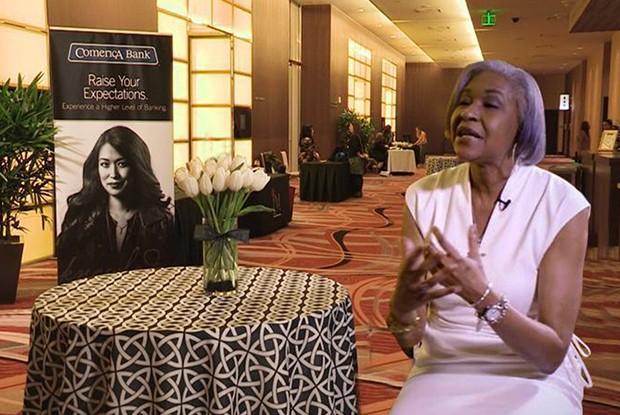Comerica Bank Women's Business Symposium: Detroit - Q&A Roundup

Ivette Mayo
Hailing from Puerto Rico, Ivette Mayo came to the U.S. as a six-year old with a significant language barrier: she could not speak English. As part of a military family, she moved around frequently and had to constantly cope with change in her life. Because of this, she developed skills in adapting to different life situations and cultures, giving her a willingness to ask questions, get help, and constantly learn. These skills have paid off throughout her career as an entrepreneur. She is an author, consultant, business coach and parent.
During our conversation, Mayo emphasized that, throughout childhood, many women are not trained to lead. The cultural expectations in many parts of society place men in traditional leadership roles, contributing to a perception among many women that they aren't able to fulfill these positions. The truth is that women are not only fully capable of leading but can also look to many other women as role models.
It's time to break the glass ceiling and rupture the barrier that stops women from embracing opportunities and supporting one another and pushes them to default to cultural norms. Furthermore, the perception of the glass ceiling can create fear and hold women back. Mayo emphasized the importance of being able to handle change as women strive for greatness.
"One of the things that we have to do to create change and innovation in the workplace is that we have to challenge traditional mindsets," said Mayo. "As we grow as a community, as technology becomes a variable in our industries … We have to be willing to change. Our culture has to fit the people we serve."
Dr. Shawne Duperon
As the founder of Project: Forgive, a 6-time Emmy winner, a media trainer, and a research and communications consultant, Dr. Shawne Duperon has ample experience leading organizations and tackling cultural and gender issues in the workplace. In fact, she's moved beyond many of the longstanding issues that often come up in "women in business" types of conversations.
When speaking with her, she mentioned that key topics, such as women specifically supporting women, are no longer relevant in her circles because practices have simply evolved. The leaders she engages with have come to understand the importance of diversity in the workplace and created an environment in which the culture is simply people supporting people.
We asked Duperon about the kind of advice she would give women striving to advance their careers, and she quickly highlighted one of her major personal philosophies: forgiveness. Duperon mentioned that many women can carry around guilt as they try to balance the expectations they have for themselves with the pressures from society, family and similar sources. Letting go of that guilt and forgiving oneself is critical to moving forward. It is also vital, according to Duperon, to not hold on to past harms and wait for an apology. Instead, learn to accept the apology you will never receive.
"To me, [forgiveness] is everything [in leadership]. As leaders, we take risks. Especially now, [business is] so disruptive, so agile … you have to take some risks to see what will work or what won't work," said Duperon. "What worked three months ago is not working now. The ability to take risks takes a strong ability to not only forgive yourself, but to also forgive your team. If you don't have that forgiveness in that realm of risk-taking, you're not going to go for it. You're not going to really step out in those realms of disruption, and that's what it's really all about right now - disruption."
Dr. Juliette Okotie-Eboh
Dr. Juliette Okotie-Eboh got her start in urban and regional planning, an arena where she worked for nearly 20 years in Detroit. Over time, she moved from planning work into corporate work, shuffling between a variety of industries before settling into a role in the gaming sector for the past 15 years.
To a great extent, Okotie-Eboh's conversation with us centered around the idea of women being strategic and more informed about their financial and career goals. She explained that women are often cautious and especially prudent as they try to balance their responsibilities with the business ideas they have. Developing stronger financial management skills can be invaluable in overcoming some of these issues.
On the whole, Okotie-Eboh highlighted that women are often very sensitive and detail-oriented, making them valuable in a variety of leadership settings. Regardless of your style, however, she emphasized that, in her experience, diversity is extremely important because having broad representation in a team can lead to stronger ideas and better results.
"You're not going to get to the same place the same way when you have teams that represent a broad spectrum of society. That's what makes a team operate better and keeps you from talking in an echo chamber. Once you can voice your ideas … whether it be conservative vs. liberal or male vs. female … I think it's great when we can all sit down together … [without diversity] you're not going to get the kind of energy [you need] in that team."
Networking in a more diverse business world
With more people embracing diversity, women have an opportunity to grow and advance in their careers that may not have been quite as accessible in the past. The Comerica Bank Women's Business Symposium series is all about fostering that growth by helping women learn from experts and build relationships.

